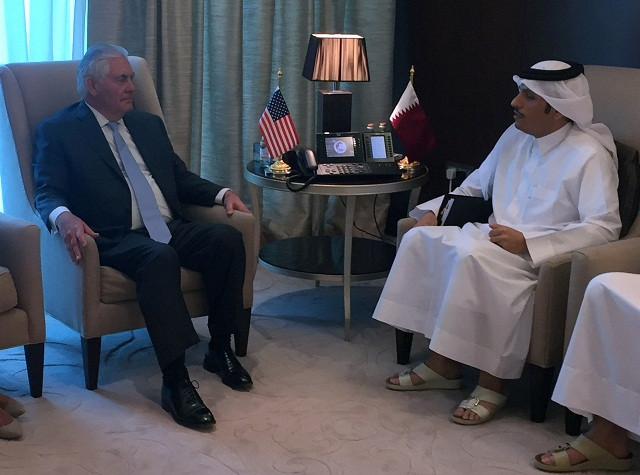Tillerson in Qatar as leaks spark fresh Gulf tension
Tillerson's team has also adopted a more neutral position against both sides in the conflict

U.S. Secretary of State Rex Tillerson meets with Qatar's Foreign Minister Sheikh Mohammed bin Abdulrahman al-Thani in Doha, Qatar July 11, 2017
PHOTO: REUTERS
Hopes of a resolution to the five-week crisis seem increasingly remote as Tillerson's arrival in Doha was overshadowed by the publication of confidential agreements between Qatar and other Gulf Cooperation Council (GCC) states in which all sides had pledged to combat terror funding and avoid interference in other states. Publication of the accords, dated 2013 and 2014, caused both sides in the deadlocked dispute to launch a fresh round of mutual accusations over ties to militant extremist groups.
Tillerson arrived in Kuwait on Monday and will visit regional powerhouse, and longtime US ally, Saudi Arabia before leaving the Gulf Thursday. Kuwait has emerged as the main mediator in the conflict between Qatar and a group of Arab states, led by Saudi Arabia, over allegations Doha was too close to both extremist militants and Shia Iran.
Qatar accuses 'neighbours' over hacking that led to crisis
Tillerson is due to meet Qatar's Emir Sheikh Tamim bin Hamad Al-Thani in Doha before returning to Kuwait later Tuesday. Tillerson does not appear hopeful of an imminent solution to the Gulf crisis, the worst to hit the GCC since its establishment in 1981. The US State Department has warned the crisis could last months. "We've had one round of exchanges and dialogue and didn't advance the ball," said adviser R.C. Hammond.
"We will work with Kuwait and see if we can hash out a different strategy." Kuwait, the United States and Britain issued a joint statement following Monday's talks, appealing to the Gulf foes "to quickly contain the current crisis and resolve it at the earliest through dialogue," according to a statement cited by the KUNA news agency. Saudi Arabia, the United Arab Emirates, Bahrain and Egypt on June 5 announced sanctions, effective immediately, against Qatar over accusations Doha supported militant extremism and was too close to Iran.
The four states severed all diplomatic ties, suspended transport links with Doha and ordered all Qataris to return home within 14 days. On June 22, the Saudi-led bloc issued a list of 13 demands which, if met, would end the sanctions, including closing broadcast giant Al-Jazeera, downgrading ties to Iran and shutting a Turkish military base in Doha. Qatar refused to comply with the demands and has consistently denied accusations of ties to militant groups.
The US has said the 13-point list was not an entirely viable option to end the crisis. "Individually there are things in there that could work," said Hammond. "This is a two-way street," he said. "There are no clean hands." The publication of the Riyadh agreements on Monday appears to have renewed hostility between Qatar and its neighbours.
US broadcaster CNN aired leaked papers in which Saudi Arabia, Qatar and Kuwait -- and later Bahrain and the UAE - had signed accords forbidding support for any opposition and hostile groups in their own nations, as well as in Egypt and Yemen. A joint statement released by the Saudi-led bloc boycotting Qatar confirmed the documents proved "beyond any doubt Qatar's failure to meet its commitments and its full violation of its pledges".
Arab states demand Qatar closes Jazeera, cuts back ties to Iran
Doha, however, maintains that the boycott is in violation of the 2013 and 2014 agreements. A statement from the Government Communications Office said the current "siege" was "a clear violation" of the GCC's charter and the Riyadh agreements. Tillerson's visit is the latest in a series by officials to the region, including UN diplomats and the foreign ministers of Germany, Britain and Oman.
The United States and its Western allies have vast economic and political interests in the Gulf, which pumps one fifth of the world's oil supplies, houses one third of proven global crude reserves and sits on one fifth of the world's natural gas deposits. Tillerson is a former CEO of Exxon Mobil. Qatar is also home to the US military's largest air base in the region, Al-Udeid. Rival Bahrain houses the US Navy Fifth Fleet.
Analysts say Tillerson's impact largely depends on his ability to manoeuvre regional scepticism over the extent to which he in fact represents the president of the United States. US President Donald Trump initially supported longtime American ally Saudi Arabia, but his stance was later contradicted when the US Department of State took a more neutral position. Tillerson's team has also adopted a more neutral position against both sides in the conflict.



















COMMENTS
Comments are moderated and generally will be posted if they are on-topic and not abusive.
For more information, please see our Comments FAQ